Self-help books for elderly women provide essential strategies for enhancing mental wellness and resilience. They focus on coping with loss, fostering connections, and promoting self-compassion. Notable authors offer practical advice tailored to the unique challenges faced by older women. Selecting the right book can empower personal growth and improve overall quality of life.
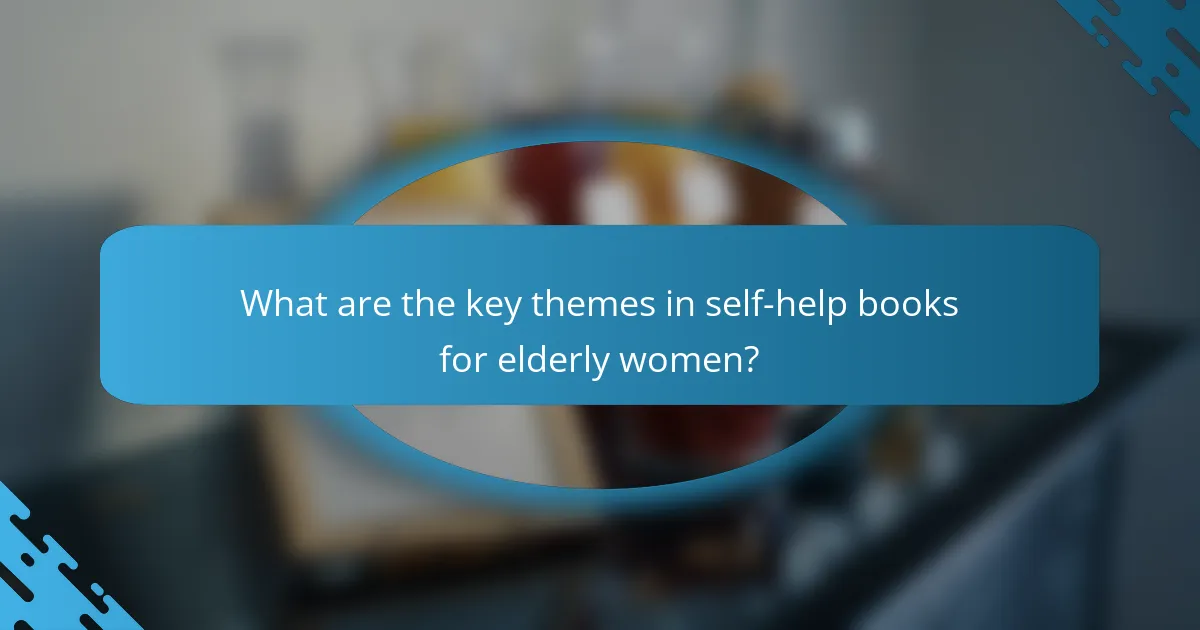
What are the key themes in self-help books for elderly women?
Self-help books for elderly women often focus on themes of resilience, self-acceptance, and emotional well-being. Key themes include mental health strategies, coping with loss, building social connections, and fostering self-compassion. These books empower women to embrace aging positively and cultivate a sense of purpose. They often emphasize mindfulness practices and personal growth, addressing unique challenges faced by elderly women. Additionally, many books provide practical advice on maintaining independence and improving overall quality of life.
How do these themes address mental wellness?
Self-help books for women enhance mental wellness by providing tailored strategies for resilience and empowerment. These resources address unique challenges faced by elderly women, fostering self-awareness and emotional strength. Engaging narratives and practical advice help in building coping mechanisms, promoting positive thinking, and encouraging proactive choices. As a result, readers often experience improved mental health outcomes and a greater sense of agency in their lives.
What role does resilience play in these narratives?
Resilience plays a crucial role in self-help narratives for women, particularly in promoting mental wellness among the elderly. It empowers individuals to navigate life’s challenges, fostering emotional strength and adaptability. These narratives often highlight resilience as a unique attribute, showcasing how it can transform adversity into growth opportunities. By emphasizing personal stories and practical strategies, self-help books encourage women to build resilience, enhancing their overall well-being and quality of life.
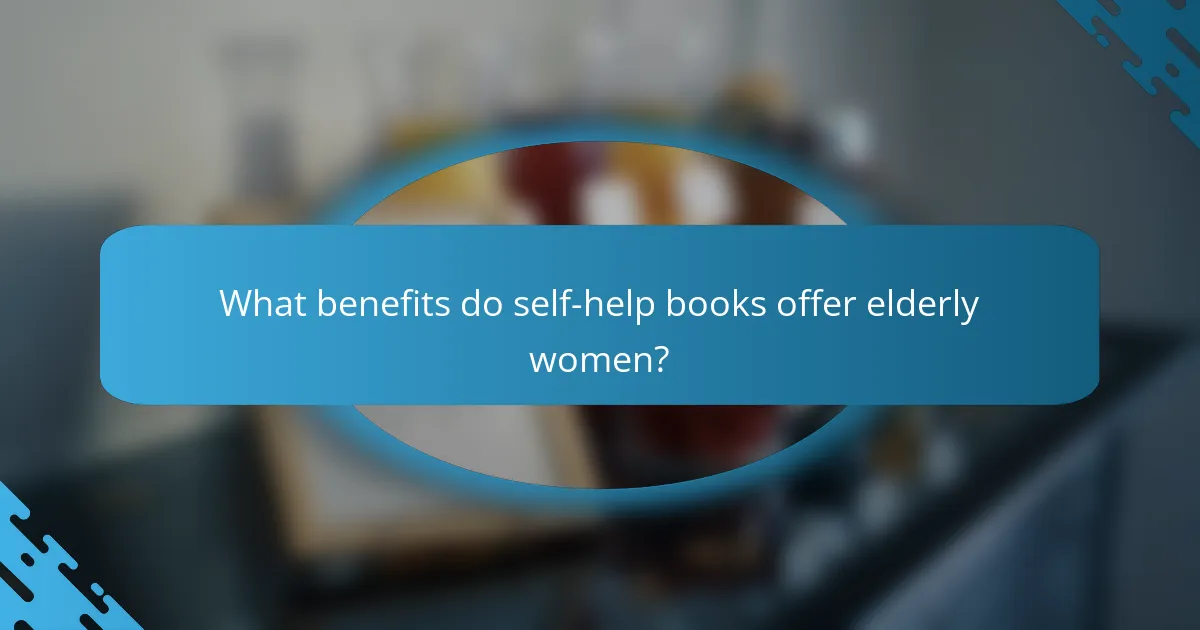
What benefits do self-help books offer elderly women?
Self-help books offer elderly women numerous benefits, including improved mental wellness, enhanced resilience, and increased self-esteem. These books provide practical strategies for coping with life changes, fostering a sense of community through shared experiences, and encouraging lifelong learning. Engaging with self-help literature can also stimulate cognitive functions, helping to maintain mental sharpness. As a result, elderly women can experience greater emotional stability and a more positive outlook on life.
How can these books improve emotional well-being?
Self-help books for women can significantly enhance emotional well-being by providing practical strategies and insights. They empower elderly women to navigate life’s challenges, fostering resilience and mental wellness. These books often emphasize self-reflection, enabling readers to understand their emotions and develop coping mechanisms. Additionally, they create a sense of community and support through shared experiences, which can alleviate feelings of isolation. Engaging with these texts can lead to improved self-esteem and a more positive outlook on life.
In what ways do they enhance social connections?
Self-help books for women enhance social connections by fostering community and shared experiences. They provide relatable narratives that encourage discussions among readers, leading to stronger bonds. These books often include practical exercises that promote group activities, facilitating deeper interactions. Additionally, they empower women to share their stories, creating supportive networks that enhance resilience and mental wellness.
What specific strategies do they recommend for building relationships?
Building relationships involves strategies that foster connection and understanding. Self-help books for women emphasize active listening, sharing personal stories, and engaging in meaningful conversations. These strategies enhance emotional bonds, promote empathy, and encourage vulnerability. Additionally, participating in group activities or workshops can strengthen social networks, providing support and resilience. Prioritizing regular check-ins with loved ones further solidifies these relationships, ensuring ongoing communication and care.
How do they promote cognitive engagement?
Self-help books for women promote cognitive engagement by providing relatable narratives and practical strategies. These books encourage reflection, critical thinking, and personal growth, enhancing mental wellness. They often feature unique attributes like targeted exercises and inspirational stories that resonate with elderly women, fostering resilience. Engaging with these texts stimulates cognitive processes, leading to improved emotional well-being and empowerment.
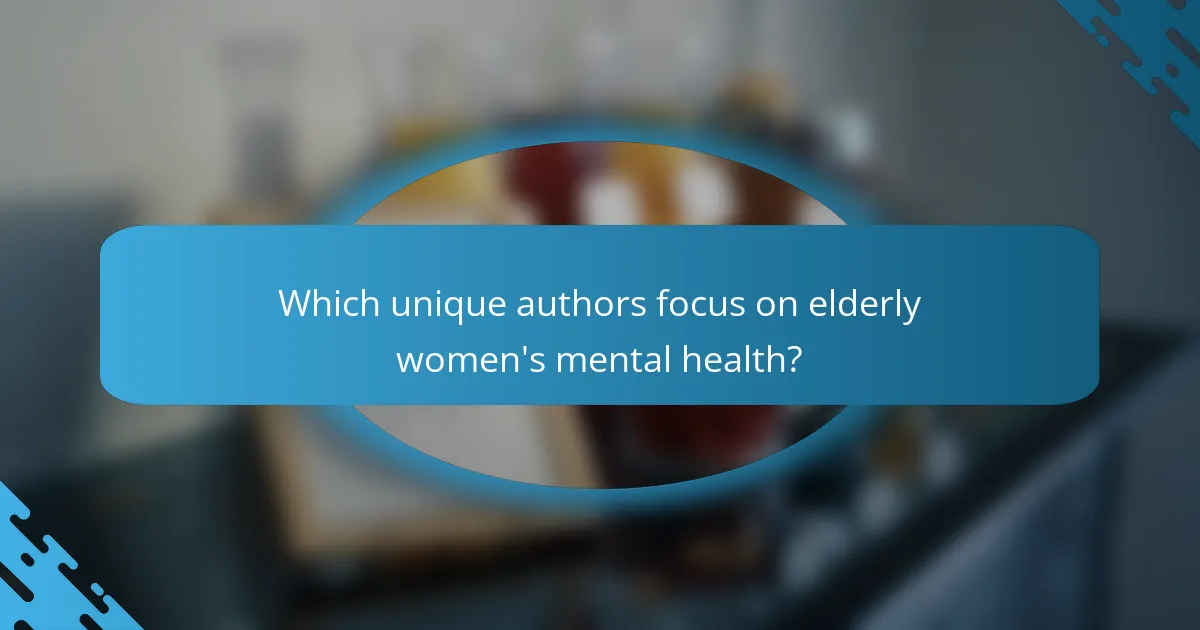
Which unique authors focus on elderly women’s mental health?
Several unique authors focus on elderly women’s mental health through self-help books. Notable figures include Louise Hay, whose works emphasize self-love and healing; Dr. Judith Orloff, who integrates intuition and emotional healing; and Dr. Mary Pipher, known for addressing aging and resilience. These authors provide empowering choices that resonate with elderly women’s experiences, promoting mental wellness and resilience.
What are the standout works by these authors?
The standout works by these authors include influential titles that focus on mental wellness and resilience for elderly women. Notable books are ‘The Gifts of Imperfection’ by Brené Brown, emphasizing self-acceptance and courage, and ‘Women Who Run with the Wolves’ by Clarissa Pinkola Estés, which explores the power of feminine storytelling. Additionally, ‘The Self-Care Solution’ by Jennifer Ashton provides practical strategies for maintaining mental health in later years. Each work addresses unique attributes of empowerment and personal growth.
How do their backgrounds influence their writing?
The backgrounds of authors influence their writing by shaping perspectives and insights. Many self-help books for women draw from personal experiences, cultural contexts, and professional expertise. For instance, authors who have faced challenges in mental wellness often provide relatable strategies, enhancing the book’s authenticity and effectiveness. Additionally, educational backgrounds can introduce unique frameworks for resilience, making the content more impactful. These diverse experiences create a rich tapestry of advice tailored to empower elderly women in their mental wellness journey.
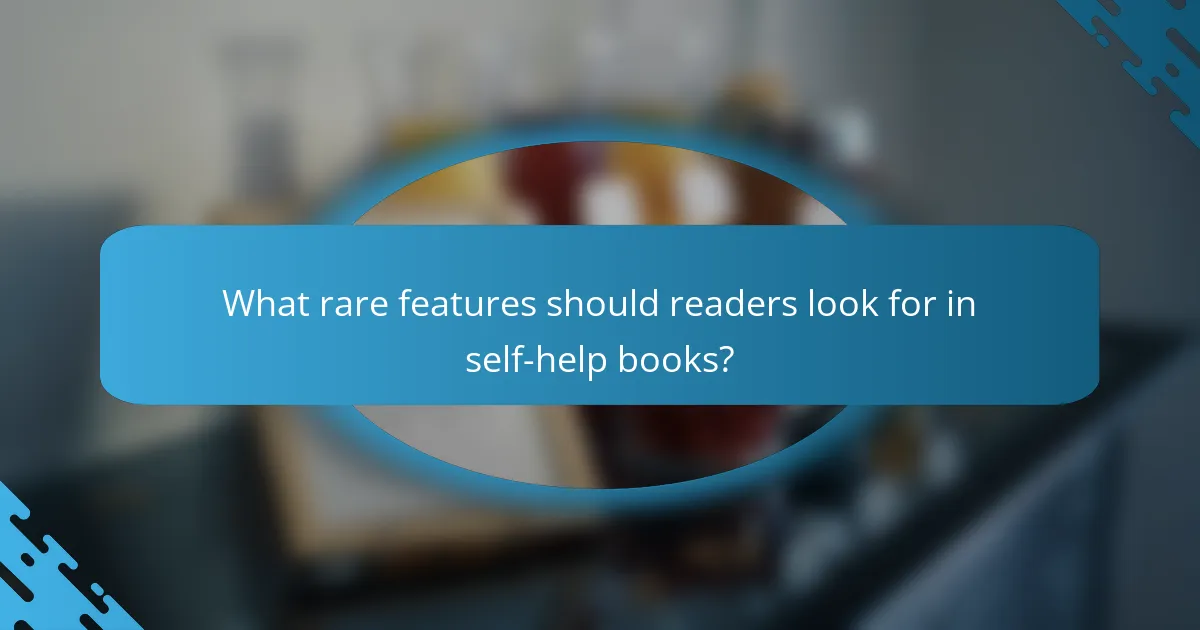
What rare features should readers look for in self-help books?
Readers should look for self-help books that offer unique features that specifically address elderly women’s mental wellness. Rare features include tailored exercises for cognitive resilience, narratives from relatable figures, and actionable strategies for daily empowerment. Additionally, books that provide community-building resources can foster social connections, enhancing emotional support. Look for those that incorporate mindfulness practices designed for older adults, as these can significantly improve mental well-being.
How do interactive elements enhance the reading experience?
Interactive elements significantly enhance the reading experience by fostering engagement and retention. They allow readers to actively participate, making the content more relatable and memorable. For instance, self-help books for women can incorporate quizzes or reflective prompts that encourage personal connection to the material, ultimately boosting mental wellness and resilience. These elements cater to unique attributes of elderly readers, such as their desire for meaningful engagement and practical application of concepts. By transforming passive reading into an interactive journey, these elements empower women to make informed choices about their mental health.
What unique perspectives do these books provide on aging?
Self-help books for women provide unique perspectives on aging by emphasizing mental wellness and resilience. These books often focus on empowering choices that enhance emotional strength and adaptability during later life transitions. They encourage self-reflection and promote strategies for maintaining a positive mindset. Many emphasize the importance of community and support networks, highlighting how connection can mitigate feelings of isolation. Additionally, they offer practical tools for coping with age-related challenges, fostering a sense of agency and purpose in the aging process.
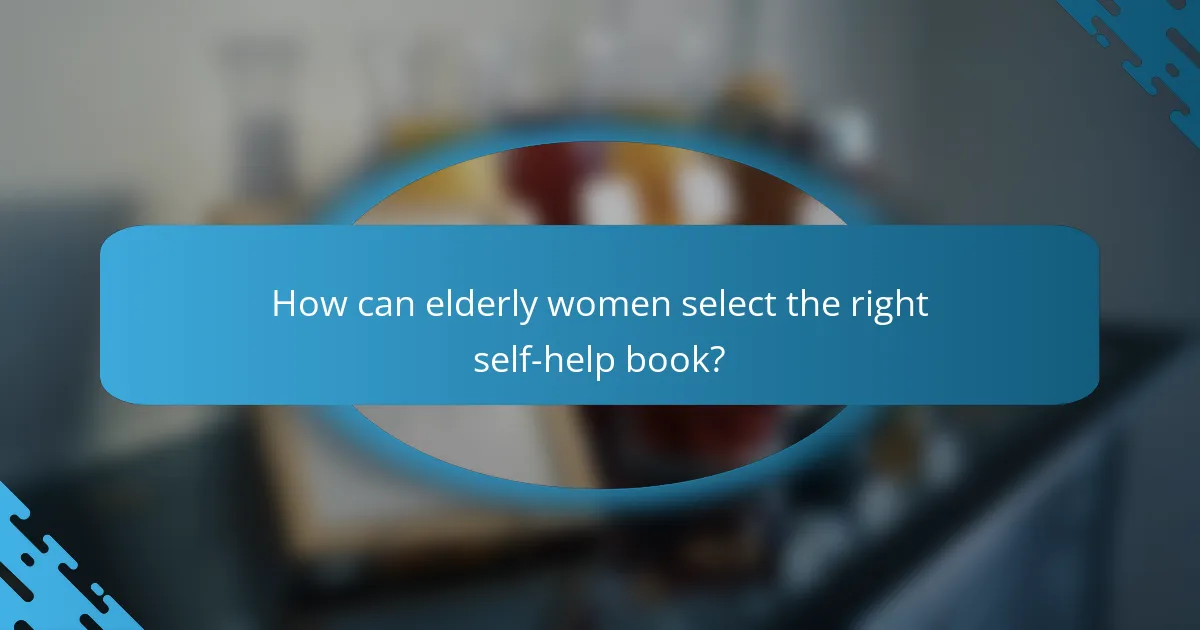
How can elderly women select the right self-help book?
Elderly women should consider personal interests, specific challenges, and desired outcomes when selecting self-help books. Look for books that resonate emotionally and provide practical strategies.
Focus on authors with expertise in elderly mental wellness, as this ensures relevant insights. Check reviews and recommendations from trusted sources to gauge effectiveness.
Additionally, explore diverse formats like audiobooks or workbooks to enhance engagement. Prioritize books that encourage reflection and personal growth.
What criteria should they consider when choosing a book?
When choosing a self-help book for elderly women’s mental wellness, consider the author’s credibility, relevance of content, and accessibility. Focus on books that address resilience and empowerment, ensuring they align with personal experiences. Look for practical exercises and relatable anecdotes to enhance engagement. Prioritize books that offer supportive community resources or references, as these can provide additional help beyond the text.
How important is the book’s accessibility and format?
Accessibility and format are crucial for self-help books targeting elderly women. These factors enhance engagement and comprehension. Large print options and audiobooks cater to visual impairments, promoting inclusivity. Furthermore, clear organization and relatable language improve retention of concepts. A unique attribute is the integration of interactive elements, such as guided exercises, which foster active participation and resilience-building. Ultimately, accessible formats empower elderly women to make informed choices for their mental wellness.
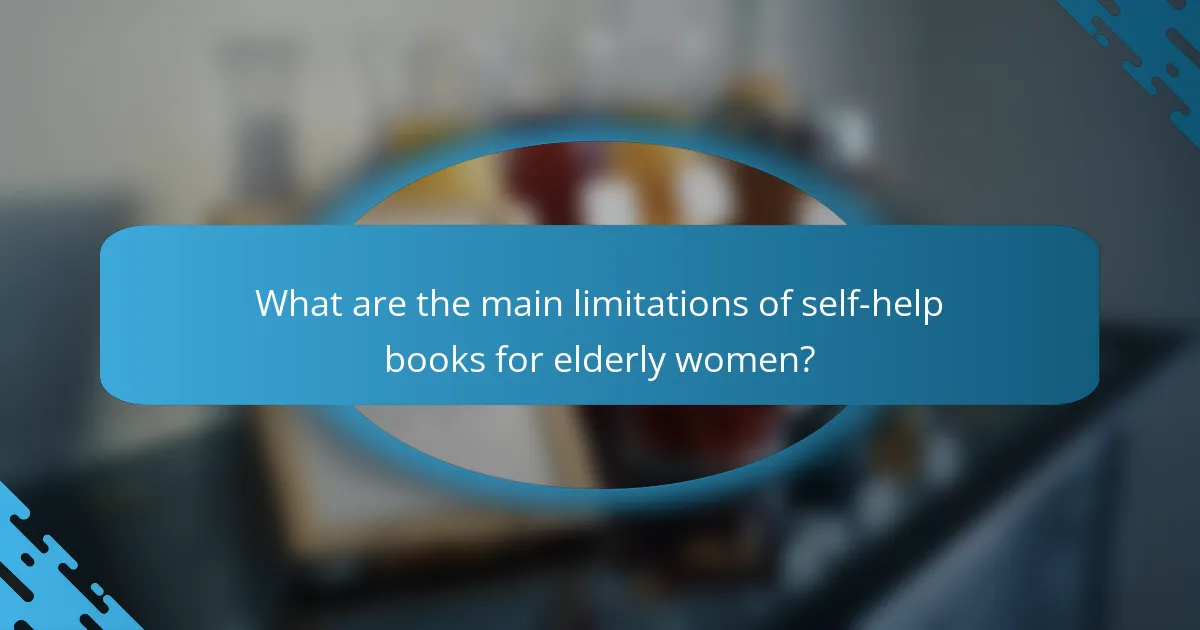
What are the main limitations of self-help books for elderly women?
Self-help books for elderly women often have limitations that can hinder their effectiveness. These include a lack of relatable content, oversimplified solutions, and insufficient consideration of unique life experiences.
Many self-help books do not address the specific challenges faced by elderly women, such as health issues, caregiving responsibilities, and social isolation. As a result, the advice may feel disconnected from their realities.
Additionally, some books present strategies that are too generalized, failing to account for the diverse backgrounds and perspectives of elderly women. This can lead to frustration and a lack of engagement with the material.
Finally, self-help books may not provide practical tools or actionable steps, leaving readers without clear guidance for implementing changes in their lives.
How can readers overcome these limitations?
Readers can overcome limitations by actively engaging with self-help books tailored for women’s mental wellness. These books provide practical strategies, foster resilience, and encourage empowerment. To maximize benefits, readers should set specific goals, create a supportive reading environment, and discuss insights with peers. Additionally, incorporating exercises from the books into daily routines enhances retention and application of concepts. Emphasizing community support and personal reflection can further enrich the experience and promote lasting change.
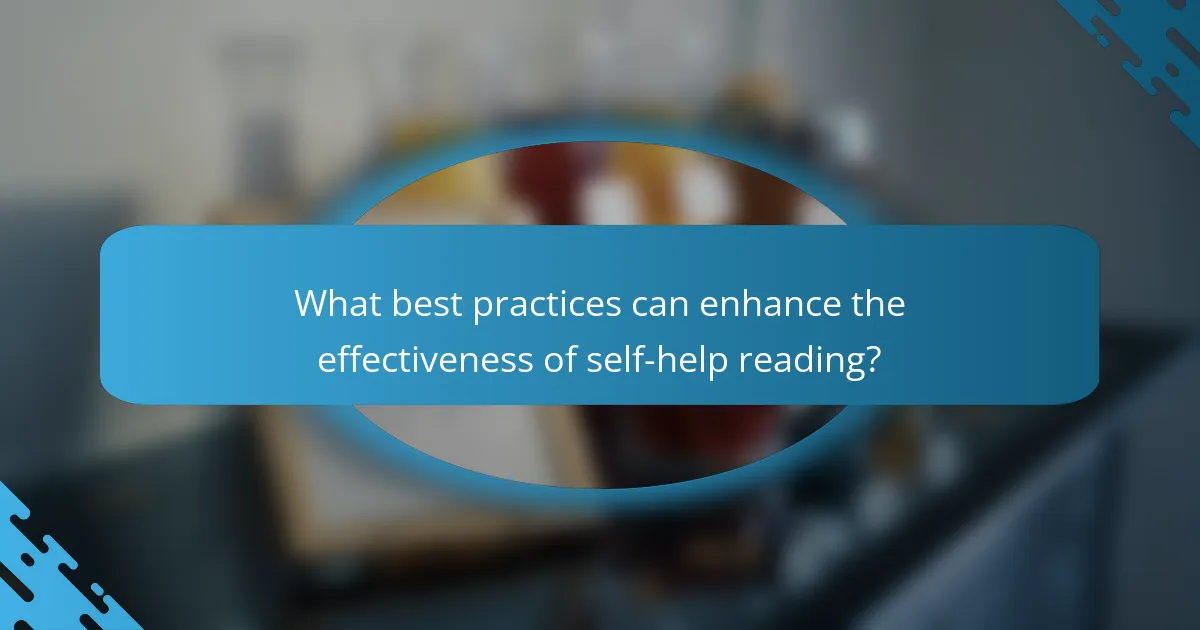
What best practices can enhance the effectiveness of self-help reading?
To enhance the effectiveness of self-help reading, women should prioritize engagement, reflection, and application. Selecting books that resonate personally fosters a deeper connection. Setting specific goals for reading encourages focus and purpose. Incorporating journaling can help articulate insights and track progress. Finally, discussing themes with peers promotes accountability and diverse perspectives.
How can setting goals improve the reading experience?
Setting goals enhances the reading experience by providing focus and motivation. Clear objectives help readers engage deeply with self-help books, facilitating personal growth. For elderly women, setting specific goals can improve mental wellness and resilience, leading to better retention of information and practical application of insights. Research shows that goal-oriented reading can increase satisfaction and cognitive engagement, making the process more rewarding.
What common mistakes should readers avoid?
Readers should avoid common mistakes like neglecting personal relevance, skipping practical exercises, and overlooking diverse perspectives. Focusing solely on one author or approach limits understanding. Ignoring emotional responses can hinder growth. Lastly, avoid rushing through books without reflection.
What expert insights can guide effective utilization of these resources?
Self-help books for women focusing on elderly mental wellness provide practical strategies for resilience. Expert insights suggest prioritizing titles that emphasize emotional intelligence and personal narratives. These resources often include exercises for self-reflection, fostering a sense of community among readers. Additionally, engaging with online forums related to these books can enhance understanding and application of the concepts presented.